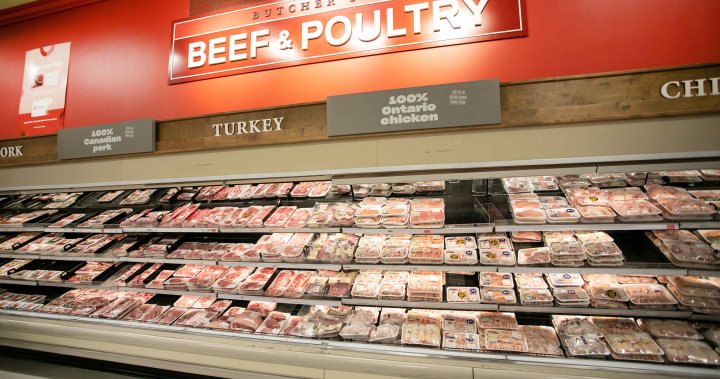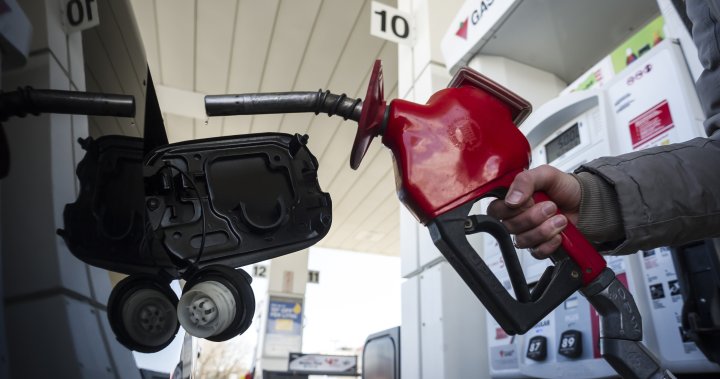Loblaw apologizes after underweighted meat sold in Western Canada stores – National

Loblaw is apologizing after the grocer confirmed some meat products sold in stores across Western Canada were underweighted compared with what was posted on the label, leading to some customers being overcharged.
The grocer confirmed the discrepancies to Global News after the problems were exposed in a CBC News investigation published Thursday.
A Loblaw spokesperson told Global News in an email that the issues were tied to “a small number of meat products sold in select stores in Western Canada.”
The CBC investigation found underweighted meat products in as many as 80 stores over an undisclosed period ending December 2023, but identified additional issues of underweighting in additional Loblaw stores after that date, as well as in one Sobey’s-owned grocer and a Walmart.
That story reported that prices were inflated by between four and 11 per cent due to the errors.
The discrepancy appeared to happen when food products were weighed to include the packaging, which runs counter to Canadian Food Inspection Agency (CFIA) guidelines, according to the CBC investigation.
“Unfortunately, the error happened as we were converting our meat trays to a more environmentally friendly format and was corrected when discovered,” the Loblaw statement to Global News read.

Loblaw said it addressed “inconsistencies” in the two additional stores identified by CBC, adding that 97 per cent of the company’s stores were “unaffected.”
The spokesperson said the grocer has “robust internal processes and controls in place” but that they are “subject to the occasional operational error.”

Get weekly money news
Get expert insights, Q&A on markets, housing, inflation, and personal finance information delivered to you every Saturday.
Global News has reached out to Sobey’s and Walmart Canada for comment on the reported underweighting at those stores.
A Sobey’s spokesperson told Global News in an email that it takes the issue of weighing products “seriously,” adding it believes the case was “isolated.” The grocer, whose brands are owned by parent Empire. Co., has taken steps to reinforce its procedures, according to the statement.
Loblaw’s statement acknowledged that “any pricing issue that results in an overcharge is one too many.”
“We apologize for these errors,” the statement read.
Loblaw said it was implementing a discount on select meat products in the affected stores, which will be visible on customers’ receipts. The spokesperson did not disclose the size of the discount, nor the names of the impacted stores.
“If a customer notices a price to weight discrepancy with any products we sell, we encourage them to bring it to our attention for immediate resolution,” the statement read.
The CFIA confirmed to Global News on Friday that the agency had responded to complaints about mis-weighted items at grocery stores including Loblaws, but did not say whether problems were identified at any particular grocer.
“The CFIA took action in every case where there was a mis-weighed product. In cases where there were errors in the declared net weight, implicated companies took corrective actions to address the cause of the error,” a spokesperson said in an email.
The spokesperson added that, when infractions are discovered, grocers will face repercussions that are “proportionate” to food safety risk and the seriousness of the non-compliance.
If a food business was found to be non-compliant again, we would take this into consideration in determining further enforcement actions,” the CFIA response read.
Mike von Massow, a food economist with the University of Guelph, told Global News he would be surprised if the underweighting was “nefarious.” He thinks a technical glitch, or lack of training or quality assurance, is a more likely scenario.

With the plastic packaging making up the difference in weights, von Massow said it’s likely that scales were improperly tared — reset to account for the size of packaging while taking a weight — than a deliberate attempt to shortchange consumers.
The alternative, that grocers have been deliberately mislabeling packaging on a nation-wide scale, would invite serious consequences.
“If it’s being done on purpose and now we’re covering our butts by saying it was an accident, well then frankly, it’s criminal. I mean, it’s fraud,” von Massow said. “And so in that circumstance, again, the reputational risk is such that I don’t think most companies would be willing to risk it.”
He also pointed out that some stores without in-house meat departments will sell pre-packaged products from external suppliers, who might also be a source of underweighting.
The Sobey’s spokesperson also noted that weights of packaging and food can fluctuate depending on whether the proteins were frozen and thawed. The grocer encouraged consumers to contact their local store if they have concerns about price and weighting.
Consumers can weigh their own products using a baking scale or similar at-home apparatus and should be more alert to potential discrepancies like this going forward, von Massow said.
In the wake of the investigation into Loblaw, he expects all Canadian grocers and the CFIA will be paying closer attention to internal weighting processes.
— with files from Global News’ Kyle Benning

© 2025 Global News, a division of Corus Entertainment Inc.








